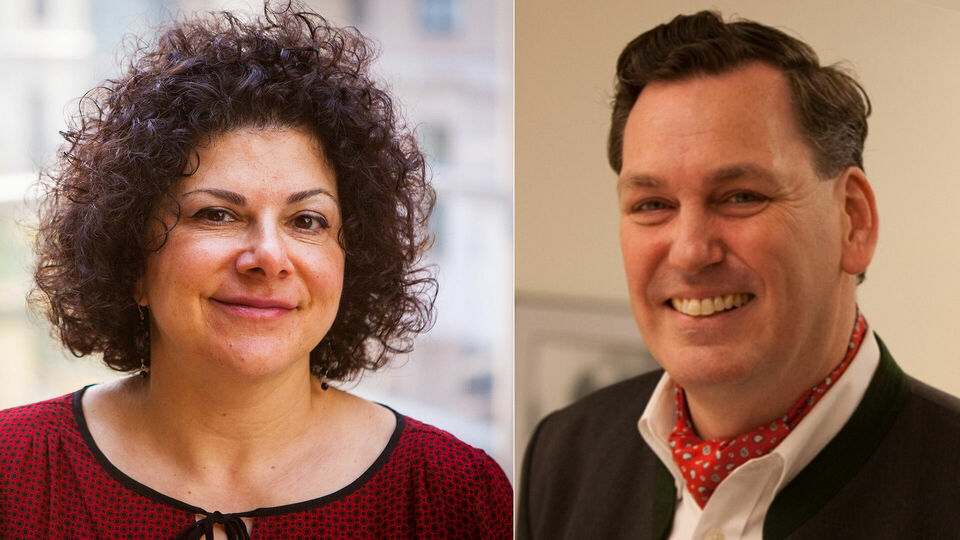TU/e awards two honorary doctorates this year
During the forthcoming MomenTUm, TU/e will take the exceptional step of awarding two honorary doctorates - this usually happens only during a lustrum year. This has been prompted by the remarkable quality of the nominations, Rector Magnificus Frank Baaijens let it be known at a recent University Council meeting. The lucky recipients are the Austrian specialist in optical communication Peter Winzer and American Jodi Forlizzi, who researches the interaction between people and computers.
The Austrian Peter Winzer is one of the most eminent researchers in the field of optical communication systems, tells his 'honorary supervisor' Ton Koonen - himself head of the research group Electro-Optical Communication Systems (Electrical Engineering). “At 46, he is still young, but worldwide he is the leading figure when it comes to new research on very fast data transfer over optical fibers.”
Koonen knows Winzer from Bell Laboratories in the United States, where the TU/e professor spent years working, and is now a fellow. “It's the place where so many major inventions have been made, like the transistor and the laser. Winzer is currently the head of the Optical Communications Systems Research department there. Some of our students have worked in his lab.”
Industrial research
The intention is that in the coming years Winzer will spend at least a week at TU/e as a visiting distinguished professor. In a response, he writes that he is very honored to receive this distinction. “First and foremost because it is coming from an institution that has for decades been at the very forefront of global photonics research. (...) As such, I view this Honorary Doctorate as a recognition by truly exceptional peers." He also emphasizes that in awarding the honorary doctorate, TU/e is showing its high regard for industrial research while, he feels, these days the emphasis is often placed on “funding-driven hypes”.
Winzer has published more than five hundred articles. He received the Thomas Alva Edison Patent Award in 2017, and a year later the John Tyndall Award (the highest distinction in the field of optical communication). Moreover, according to Koonen, with an h-index of 67, Winzer is the only engineer working in industry who can call himself a Clarivate Highly Cited Researcher.
Two honorary supervisors
The American professor of Human-Computer Interaction Jodi Forlizzi has the luxury of having two honorary supervisors: Berry Eggen and Aarnout Brombacher. This isn't uncommon, according to Eggen, professor of Design for User Experience in Ambient Intelligent Systems. “It's partly due to the fact that Aarnout, as then Dean of Industrial Design, and I as Director of Research worked with Jodi Forlizzi some eighteen months ago during the successful research assessment of our department; she was on the assessment committee.”
But both professors have known Forlizzi longer than this, tells Brombacher. “Our department has close links with Carnegie Mellon University, where Jodi works. For example, two of our co-workers, Kees Overbeeke and Joep Frens, have held the Nierenberg Chair of Design there. Her research covers both Berry’s field and mine, and actually that of our whole department. Jodi is one of our own, you could say, and that makes her the ideal candidate for an honorary doctorate. What's more, as the Rector has already said, she is, of course, a very good researcher. Ten years ago Industrial Design nominated Bill Buxton for an honorary doctorate, and we see Jodi as being of the same caliber.”
Design-oriented
Forlizzi combines an interest in artificial intelligence data and machine learning with a design-oriented approach, Eggen explains. “These are precisely the core areas of our department.” These days almost everyone is working on artificial intelligence and data, Brombacher points out. “What makes her unique is her ‘research through design’ approach to these subjects. Not just theoretical, but also going right ahead and making something and seeing how people use it. That's entirely consistent with our own research philosophy.”
The professors expect Forlizzi to be in Eindhoven often. “She also recently joined our department's Advisory Council,” says Brombacher, “so for that reason alone we expect to see her here more often.”
In her reaction, Forlizzi herself stresses her gratitude to the people around her. "I wish to thank my students and colleagues, without whom I could have accomplished very little. The collegiality and support I’ve received over the years have been tremendous, spanning institutions worldwide."




Discussion